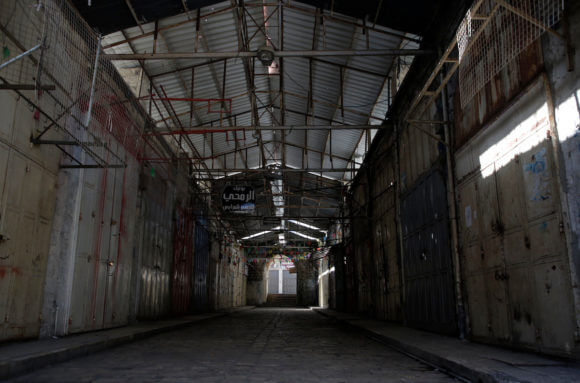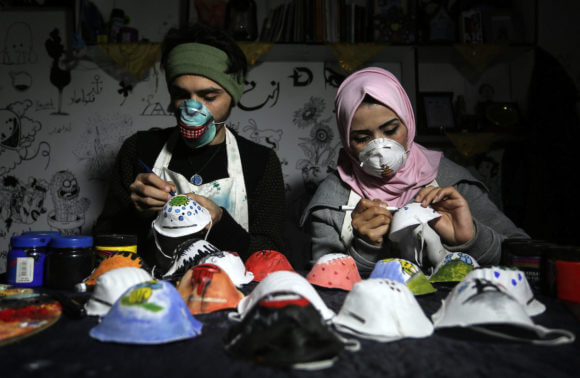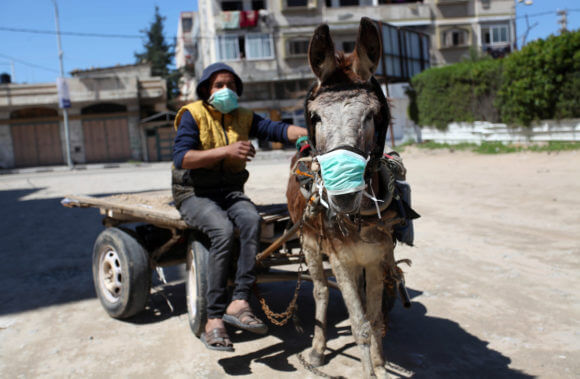The Latest:
- First coronavirus-related Palestinian death reported this week in the West Bank
- 82 Palestinians in the West Bank tested positive for COVID-19
- 9 Palestinians in the Gaza Strip tested positive for COVID-19
- 2,693 Israelis have tested positive for COVID-19
- 8 Israelis have died from coronavirus-related causes
- The ministry of health in Gaza said they are equipped to care for only 100 critical cases
- Palestinian officials tighten travel inside of the West Bank, banning movement between cities

Stay home, and stay put
Palestinians are mostly holed up inside to their homes. The West Bank is now in the third week of a state of emergency with more stringent closures announced on Monday when Prime Minister Mohammed Shatteyeh ramped up coronavirus mitigation policies. He banned travel between Palestinian governates in the West Bank, limited public activity to essential errands, asked Palestinian citizens of Israel not to visit, and prohibited Palestinians who work inside of Israeli settlements from traveling to their jobs.
In a statement sent out to media, his office described the measures as a “curfew” that would last “for a duration of 14 days.” Understandably, many Palestinians see some degree of parallel between the lockdown in the West Bank from the COVID-19 pandemic and during the first and second intifada. Our correspondent Yumna Patel is on the frontline. She’s based in Bethlehem and reported police and preventative security have been deployed at the entrances of cities and villages to enforce closures.
On Wednesday Mondoweiss’s founder Phil Weiss interviewed Patel in a live-streamed video from Aida refugee camp and worth checking out if you missed it the first time around.
Watch the livestream recording here.
Returning laborers spark new concerns
Thousands of Palestinian laborers are returning to the West Bank from Israel, and are bringing the coronavirus along with them.
The West Bank saw a spike in confirmed coronavirus cases in the past two days, with the vast majority of the new cases traced back to laborers who had just returned from Israel.
Approximately 40,000 workers traveled into Israel last week with plans on staying in the country for two months, upon direction from the PA and Israeli Ministry of Defense. The move was intended to sustain a significant portion of both the Israeli and Palestinian economies, while also preventing the spread of the virus between Israel and the West Bank.
But after it was found that workers were being mistreated by employers, and Israel was dumping sick workers at West Bank checkpoints, the PA called the workers back home, saying it was the best decision for their safety.
Our correspondent Yumna Patel writes: “despite the government’s best efforts, it is practically impossible for the PA to keep track of the movement of all the workers.”
While the PA has so far done an exceptional job at “flattening the curve” in the West Bank, the arrival of the laborers could turn the tides, for the worse.
Not taking any risks
In Gaza, over the last week more and more Palestinians decided to self-isolate.
Reporter Abdallah Aljamal spoke to families waiting out the pandemic from their homes. He spoke to a couple living in a cramped one-bedroom in the al-Nusierat refugee camp with their two children. Ever cautious, even though they aren’t leaving their flat they insist their children aged 9 and 5 always carry hand sanitizer on them.
Gaza is home to around two million people and the population density has long been a worry for epidemiologists, human rights workers, governments, basically anybody. Not even a month ago we were reading in the Lancet about “ a silent but serious outbreak” of measles ripping through the Gaza Strip, infecting newborns too young to vaccinate. Today we now know the coronavirus pandemic has reached Gaza. It spread from two Palestinians who recently re-entered from abroad and the virus spread, infecting seven security guards according to updates from the ministry of health in Gaza.
We’re following the ministry’s new website for the most up to date information. The website is in Arabic and offers some additional tools that are useful to Palestinians during this time. There are instructions for reporting price gouging, which we haven’t heard any reports about.
Know your digital rights?
As of Thursday afternoon, 19 countries including Israel are using digital tracking measures to monitor individuals infected with COVID-19. In Israel, the policies lean on the more invasive side of what we see happening. Authorities can now monitor movement through cellphones without a court warrant.
We’re watching the list of governments expand warrantless tapping through this digital rights tracker built by a team that runs a VPN review site.
“The world is growing increasingly hostile to online privacy.”

Links of Interest
- In Palestine, the Unequal Effects of an Epidemic in a Settler Colony (Jadaliyya)
- Corona Radiata (LA Review of Books)
- During the Coronavirus crisis, Israel confiscates tents designated for clinic in the Northern West Bank (B’Tselem)
- Toolkit: Palestine Organizing & COVID-19 (US Campaign for Palestinian Rights)
- Structural violence in the era of a new pandemic: the case of the Gaza Strip (The Lancet)
- Solidarity in the time of Coronavirus (Jewish Voice for Peace)


